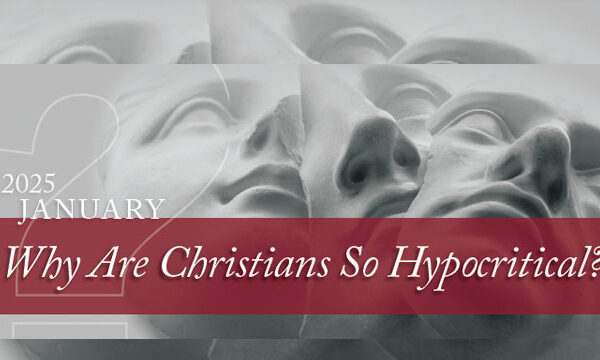We’re not all professional actors, but we’re all actors. At some point or other, we all pretend to be something we’re not. More seriously, we all hold people to standards we ourselves fail to meet. Each of us has a hypocrite’s mask, and Christians, for all their follies, haven’t cornered this particular market.
Hypocrisy includes the church, but it certainly isn’t limited to it. This is a deeply human problem. But it must be said that this response doesn’t fully answer the objection. Those who follow Christ are instructed by the apostle Paul not to be “conformed to this world,” but instead to be “transformed by the renewing” of their minds. When professing Christians fail to lead transformed lives, folks outside the church understandably doubt the sincerity of their convictions. Put simply, Christians shouldn’t look like everyone else.
But they often do. Why? Dallas Willard used to say that we should begin church services like Alcoholics Anonymous (AA) meetings: “Hi, my name is Cameron McAllister, and I’m a recovering sinner.” Let’s revisit the apostle Paul, this time in his letter to the Philippians. Consider these words:
“Not that I have already obtained this or am already perfect, but I press on to make it my own, because Christ Jesus has made me his own. Brothers, I do not consider that I have made it my own. But one thing I do: forgetting what lies behind and straining forward to what lies ahead, I press on toward the goal for the prize of the upward call of God in Christ Jesus. Let those of us who are mature think this way, and if in anything you think otherwise, God will reveal that also to you.” – Philippians 3:12–15 (ESV)


When we think of transformation in the lives of Christians, we need to think in present-tense terms. Every Christian, like Paul, is a work in progress—a person “being saved” (1 Corinthians 1:18). Moreover, different Christians are at different stages of the journey, displaying varying levels of spiritual maturity. To be sure, this state of affairs can be surreal. Some old people are spiritual infants; some young people are spiritual grown-ups; some giants are spiritual shrimps, and some shrimps are spiritual giants. This is part of what Christ is getting at when He says that the first shall be last and the last shall be first.
Varying levels of spiritual maturity is one thing, but what about so-called believers with a consistent track record of malicious behavior? Christ Himself informs us that we will know His disciples by their fruits. If the entire shape of a person’s life is characterized by viciousness, we have good reason to question their convictions. But what about those professional frauds who seem to slip by undetected? In this case, we must contend with the Lord’s sobering words in Matthew.
Not everyone who says to me, “Lord, Lord,” will enter the kingdom of heaven, but the one who does the will of my Father who is in heaven. On that day many will say to me, “Lord, Lord, did we not prophesy in your name, and cast out demons in your name, and do many mighty works in your name?” And then will I declare to them, “I never knew you; depart from me, you workers of lawlessness.” Matthew 7:21–23 (ESV)
Notice that these “workers of lawlessness” are performing miracles. It’s likely that some of them have achieved high levels of fame and notoriety. If Christianity is true, however, the Lord alone has full access to a person’s interior life. Sure, our social charades may convince others that our lives are perfect, but God certainly isn’t fooled. The hard truth is that when we consider hypocrisy in the church, we must admit that some who claim to follow Christ are deceiving and self-deceived.
But if hypocrisy is indeed a universal problem, it also serves as a timely reminder of our need for a Savior. According to Scripture, the problems dogging humanity are more severe than poverty and ignorance, as serious as those are. Sadly, a sterling education doesn’t guarantee moral behavior any more than a big bank account does. Even with the best of resources and in the best of circumstances, we still do ourselves and others harm. To use scriptural language, we are fallen. We are sinners.
Jesus came to earth on a rescue mission. In all of human history, His is the one perfect life, the shining example, and the beacon of hope for us all. He alone can address what we are and point us to what He would have us become. True Christians are the ones who have made Jesus their Master and who stagger forward on the road to becoming like Him, picking up many scrapes and bruises on the way. They aren’t perfect, but their Master is, and He’s the reason they keep pressing stubbornly forward, even if they have to limp.
When we consider the question of hypocrisy in the church, here are two responses that will help us face the question honestly: (1) Search your own heart and consider the times you’ve pretended to be something you’re not and held others to a standard you yourself fail to meet. (2) Take a hard look at Jesus. Since He is the heart of Christianity, it makes more sense to evaluate the Christian faith based on Jesus’s life than on some of the ill-behaved blockheads who make the news with their scandals.












